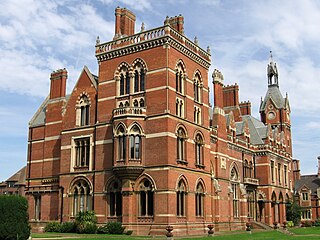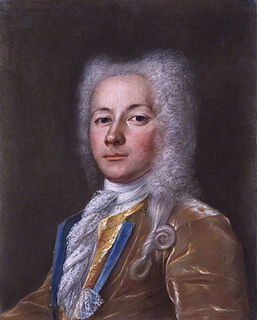Related Research Articles

Charles Manners-Sutton was a bishop in the Church of England who served as Archbishop of Canterbury from 1805 to 1828.

Duke of Rutland is a title in the Peerage of England, named for Rutland, a county in the East Midlands of England. Earldoms named after Rutland have been created three times; the ninth earl of the third creation was made duke in 1703, in whose family's line the title continues. The heir apparent to the dukedom has the privilege of using the courtesy style/title of the Marquis/Marquess of Granby.

Charles Manners-Sutton, 1st Viscount Canterbury, was a British Tory politician who served as Speaker of the House of Commons from 1817 to 1835.

John Manners, 3rd Duke of Rutland KG PC was an English nobleman, the eldest son of John Manners, 2nd Duke of Rutland and Catherine Russell. Styled Marquess of Granby from 1711, he succeeded to the title in 1721, cutting short a brief career in the House of Commons, where he had represented Rutland as a Whig.

Baron Manners, of Foston in the County of Lincoln, is a title in the Peerage of the United Kingdom. It was created in 1807 for the lawyer and politician Sir Thomas Manners-Sutton. He served as Solicitor-General from 1802 to 1805 and as Lord Chancellor of Ireland from 1807 to 1827. Manners-Sutton was the fifth son of Lord George Manners-Sutton, third son of John Manners, 3rd Duke of Rutland. His elder brother Charles Manners-Sutton was Archbishop of Canterbury from 1805 to 1828 and the father of Charles Manners-Sutton, 1st Viscount Canterbury, Speaker of the House of Commons from 1817 to 1834. The first Baron's great-grandson, the fourth Baron, assumed the surname of Manners only. As of 2010 the title is held by the latter's grandson, the sixth Baron, who succeeded his father in 2008.

John Manners, 2nd Duke of Rutland KG, styled Lord Roos from 1679 to 1703 and Marquess of Granby from 1703 to 1711, was a British Whig politician sat in the English and British House of Commons from 1701 until 1711, when he succeeded to the peerage as Duke of Rutland.

Viscount Canterbury, of the City of Canterbury, was a title in the Peerage of the United Kingdom. It was created in 1835 for the Tory politician Sir Charles Manners-Sutton, who had previously served as Speaker of the House of Commons. He was created Baron Bottesford, of Bottesford in the County of Leicester, at the same time, also in the Peerage of the United Kingdom. Manners-Sutton was the son of the Most Reverend Charles Manners-Sutton, Archbishop of Canterbury, fourth son of Lord George Manners-Sutton, third son of John Manners, 3rd Duke of Rutland. His uncle was Thomas Manners-Sutton, 1st Baron Manners, Lord Chancellor of Ireland.
A Lord of the Bedchamber, previously known as a Gentleman of the Bedchamber, was a courtier in the Royal Household; the term was first used in 1718.

Grace, Lady Manners was an English noblewoman who lived at Haddon Hall near Bakewell, Derbyshire. She founded Bakewell's Lady Manners School in 1636.

Thomas Manners-Sutton, 1st Baron Manners, was a British lawyer and politician who served as Lord Chancellor of Ireland from 1807 to 1827.

Lord George Manners-Sutton, born Lord George Manners, was a British nobleman and politician, the third son of John Manners, 3rd Duke of Rutland.

Kelham is a small village and civil parish in Nottinghamshire about 3 miles (4.8 km) northwest of Newark on a bend in the A617 road near its crossing of the River Trent. The population of the civil parish taken at the 2011 census was 207.
Robert Sutton, 1st Baron Lexinton was a Royalist MP in 1625 and 1640.
Robert Sutton, 2nd Baron Lexington PC was an English diplomat.
Gentleman of the Bedchamber was a title in the royal household of the Kingdom of England from the 11th century, later used also in the Kingdom of Great Britain.

Sir Robert Sutton was an English diplomat and politician who sat in the House of Commons from 1710 to 1720.
Sir Richard Sutton, 1st Baronet, of Norwood Park in Nottinghamshire, was a British politician who sat in the House of Commons from 1768 to 1796.

There have been four baronetcies created for persons with the surname Sutton, one in the Baronetage of Great Britain and three in the Baronetage of the United Kingdom. One creation is extant as of 2008.

Sir George Manners (1569-1623) of Haddon Hall in Derbyshire, England, served as a Member of Parliament for Nottingham, 1588–1589, and for Derbyshire, 1593–1596. His elaborate triple-decked monument with kneeling effigies of himself and his wife and family survives in the Vernon/Haddon Chapel, All Saints Church, Bakewell, Derbyshire.
Manners-Sutton is a surname, and may refer to:
References
- Chisholm, Hugh, ed. (1911). . Encyclopædia Britannica . 16 (11th ed.). Cambridge University Press. p. 526.
- Leigh Rayment's Peerage Pages [ self-published source ][ better source needed ]